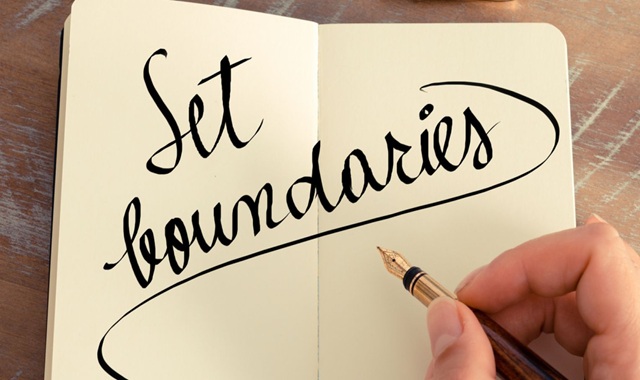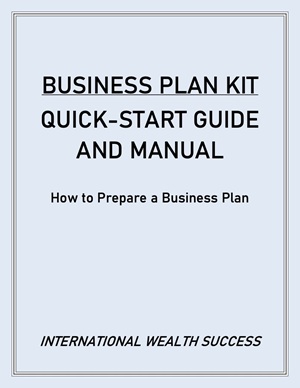Setting Boundaries
Do you have difficulty putting your own needs above those of others?
Then, you likely have issues with setting personal boundaries. Many of us struggle with this today. It seems more than ever before that people are happy to let others pick up their slack or avoid taking responsibility for themselves and their actions.
What this means, to those of us who lack firm boundaries, is that we are the ones who take responsibility for others and pick up the slack. If we have weak personal limits, other people know this and take advantage of our desire to feel needed and of our overdeveloped responsibility muscle. They continue to expect us to prioritize their needs.
It is up to each of us to determine what we are comfortable doing in any relationship so that we stop feeling manipulated and can enjoy our lives.
Do You Need Stronger Personal Boundaries?
How do you know if you could use a shoring up of your boundaries?
Answer these questions to find out:
- Do you believe your happiness depends on others?
- Are you unable to say no, even when you want to?
- Do you feel responsible for other people’s feelings?
- Are you more concerned with what others think of you than what you think of yourself?
- Do you feel constantly drained by all you have to do?
- Do you neglect your own needs, even basic care, such as eating and sleeping?
- Would others say you are a people-pleaser?
- Do you often feel resentful or taken advantage of, though you’d never admit it?
- Do you find time to take care of others, but never find time to take care of yourself?
- Do you find it hard to make decisions, and let others make them for you?
- Do you consistently ask for others’ opinions before you take action?
- Do you tend to take on the emotions or moods of others in your environment?
- Do you find it nearly impossible to ask for help, even when you are struggling?
- Do you feel others’ opinions are more valid than your own?
- Are you frequently unaware of how you feel or what you want?
- Do you often feel anxious or afraid, though you aren’t sure of what?
- Are you overly sensitive to criticism and so try to please everyone all the time?
- Do you always go only with what other people want instead of voicing your desires? Maybe because it’s simpler like that, or because you are afraid of making someone angry?
If you recognize yourself in many of these questions, fear not!
Next, we are going to discover how to set healthy personal boundaries and provide ways you can get started creating yours today.
Healthy Personal Boundaries
What is a healthy personal boundary? If no one ever taught you how people should treat you, or you were never encouraged to determine what you are willing to put up with, you may believe that setting boundaries only leads to becoming hard and uncaring. But nothing could be further from the truth.
You deserve to be treated fairly and kindly, just like others do. You deserve to choose to say no to taking on others’ responsibilities and choosing how you spend your time. Setting healthy personal boundaries isn’t about barricading yourself behind a wall, so you don’t get hurt. It’s about respecting yourself enough to admit what you want and demand it from others in your life.
Setting strong personal boundaries is an absolute must on your life journey to making yourself a priority in your own life. It’s a foundational part of the process, and without them, you’ll soon be back to saying yes to everyone’s needs and wants except your own. Building healthy boundaries is one of the best ways you can put yourself and your needs first. They protect you from being taken advantage of, from being a doormat. They define who you are in each of your relationships and help you be more fully aware of who you are and what you want and deserve.
Personal boundaries also teach others how to treat you—with respect and care. They encompass your feelings, thoughts, beliefs, choices, intuition, needs, and wants. Your boundaries should stay firm and clear, though you can choose in what situations to allow them to be flexible. They aid you in discovering your true self and making sure you live life on your terms. They develop your self-awareness and self-respect.
Steps to Setting Healthy Personal Boundaries
Now that you understand what boundaries are and you know yours should be stronger, let’s look at the steps to begin setting yours today. It’s important to realize and remember that setting boundaries is not a one-time deal. You will need to practice using them in different situations on an ongoing basis. As you get more comfortable with asserting them, you’ll find it easier and more natural to use them. No one is born with boundaries in place. Each of us needs to decide for ourselves what ours are and then stand firm in expecting them to be met and accepted by others. This process is learned, and everyone can do it!
Understand Yourself
The first thing you need to do is decide how you want to be treated by others. After all, if you don’t know yourself, how can you determine how you want others to treat you and what you will and will not accept in your life? Most people who bend over backward to help others while ignoring their own needs haven’t taken the time to discover who they truly are and what they want. That won’t happen overnight, but you can start today.
One excellent way to begin this journey of self-discovery is to start a journal. No one besides you will see it, so that you can be open and honest about your thoughts and feelings. You may want to start by coming up with ten or more ways to fill in the blanks of these statements:
People may not ___________.
I am not responsible for ____________.
I deserve ___________.
It’s safe for me to ask for ____________.
It’s appropriate for me to ____________ as a way of guarding my energy and time.
You may want to continue to journal as you find yourself reestablishing your newfound boundaries in a different situation. How did you handle a request today to take on a project way out of line with your job description? How could you respond differently the next time a loved one expected you to help them out of a jam?
Journaling is a way to give you practice thinking about how to establish your boundaries in advance of needing them. Use the statements above to come up with the language you want to use the next time someone expects you to bail them out of trouble or when you want to ask for something you need. This simple act can give you more confidence, so you feel secure in your ability to stand your ground at the moment these types of challenges occur.
Clarify your Values
When we focus on other people’s needs and wants only, we stop spending time on ourselves to discover what we want and need. Now’s the time to change that!
You may want to use your journal as a way to clarify what you value in your life
- What do you want more of in your life?
- What are your deepest desires?
- How would you like to spend your free time (you’ll have a lot more of it once your boundaries are in place)?
- How would you like to practice more self-care?
- What do you want to achieve in your life?
- What things in your life would you like to change?
Once you know what you desire and value in life, you’ll be able to use those to make decisions about how you spend your time and energy. Anything that doesn’t align with them will get an automatic, no thanks.
Choose Your Company
Just because you’ve always eaten lunch with a co-worker or been friends with someone for years doesn’t mean you have to continue. Now that you are more aware of what you want, it’s a great time to reevaluate who you spend time with and who your friends are. You’ll want to enjoy time with people who respect your boundaries and who are positive and supportive.
Pause
When someone asks you to take care of something or attend a function, you should pause before you answer. You’ve spent years saying yes to everything, and it’s going to take some time to change that default answer from escaping your mouth. Practice telling them you’ll think about it. Or, if it makes you more comfortable, say you’ll have to check your calendar and get back to them. That will give you the time and space to decide if it’s something you genuinely want to take part in or not.
Accept the Process
Because making yourself a priority and putting boundaries in place is a process, you must accept that you won’t always deal with situations correctly. You may go into the automatic yes mode and regret having agreed later. You may allow someone to make a joke at your expense just because you have gotten used to it. There will be slip-ups, but that doesn’t mean you aren’t making progress! Learn from each experience and keep going. Be kind to yourself and accept that all journeys have their ups and downs.
Feel into your Body
When a situation occurs or you are asked to take on a new responsibility, check in with your body. How do you feel within yourself? Do you feel relaxed? Are you naturally smiling? Do you feel excited by the prospect? Or, are your shoulders tight? Is your stomach queasy? Get to know how your emotions show up in your body. Begin using the way your body responds to gauge whether a situation is good for you. With some practice, you won’t even need to think about it—it will become second nature.
Beware the Vampires
Now that you know you can use your body as a reaction gauge, begin noticing how it feels around different people. We all have to deal with the occasional energy vampire—a person who drains you of energy just by being around them. They are happy to let you do their work and fix their problems. They come to you constantly asking for advice (which they rarely take), ask for a favor after a favor, but are too busy when you need help. You may find there are several of these energy vampires in your life.
They are pros at latching on to individuals who will continue to give them what they need to feel happy—your energy. Using your body as your guide, notice who saps your energy and then find ways to weed them out of your life. Once you stop taking care of their lives for them, they will soon leave you alone and find someone else to do their bidding. And you’ll be much happier without them.
Resist the Urge to Fix
Have you ever noticed how many people come to you to vent their frustration and anger? How about when friends and co-workers call to ask for advice or help with a project? It will take some practice, but resist the urge to fix their lives for them. Instead, show compassion and empathy. You can be a sounding board for a loved one without needing to fix their problem. Those who only want you to fix them will gradually move on to find someone who will do that once you stop.
Embrace Flexibility
Just because you have set personal boundaries doesn’t mean you have to say a firm no to everything. Each situation is a bit different. And, you may find as time goes on, you want to alter your boundaries. That’s perfectly normal. Use your new tools of pausing and using your body as a gauge to determine when you feel genuine excitement about the prospect of taking on a new project or going along with the crowd. Your new motto should be “If it feels right, do it.”
Tips for Stating Your Boundaries
Up until now, all of this might sound thrilling, but put in a position where you need to stand your ground, you might not be so sure of yourself. That’s normal. As we’ve said, creating and maintaining your limits is a process that will become easier the more you practice.
Don’t worry. We aren’t going to leave you to your own devices on how to go about standing up for yourself! You may be worried that putting boundaries in place will turn you into a selfish, harsh person. But trust us when we say that there are ways to do this that are kind and gentle. Below are some suggestions to stand up for yourself without feeling like a monster.
- Stating your boundaries isn’t a commentary. Don’t give in to the feeling that you need to explain or defend your decision. The other person doesn’t have the right to judge or comment on your decision.
- If someone starts to beg or argue with you after you set a boundary, simply restate your original explanation and end the conversation. Be firm, but courteous.
- Use unassuming, direct language when standing your ground. Don’t give excuses or explain why you’ve come to this decision. You only need to state your answer or choice.
- If you have judgmental people in your life, start drawing attention to your needs by telling them that it’s not okay with you for them to criticize. Tell them that you would like them to stop commenting on your choices or whatever aspect of your life they judge.
- Remember, pausing before agreeing to something is your new best friend. Let the asker know you’ll need to sleep on it or check your schedule, but that you’ll get back to them. That way, you’ll have time to decide if you want to say yes, and if not, how you will tell them, “thanks, but no thanks.”
- If someone is offended or angered by your new boundaries, keep in mind that it is their issue. Most likely, those people are the ones who have consciously chosen to come to you in the past because they think you’re a pushover. When you start to stand your ground, they won’t like it. But don’t back down! Soon they’ll be someone else’s problem.
<<<<<< Part One | Next Part >>>>>>











I loved this!!! It’s good to have a reminder to set your boundaries!
Thanks for your input, Madison.
Boundaries are an interesting subject.